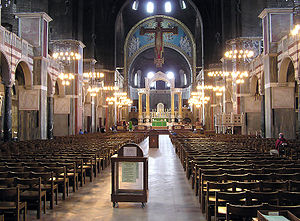- Missa Brevis (Britten)
-
 Interior of Westminster Cathedral where the Missa Brevis in D was first performed.
Interior of Westminster Cathedral where the Missa Brevis in D was first performed.
The Missa Brevis in D, Op. 63 is a setting of the Mass composed by Benjamin Britten on Trinity Sunday, 1959.[1] It was first performed at London's Roman Catholic Westminster Cathedral on 22 July of the same year.[1] The piece is set for three-part treble chorus and organ.
The printed dedication reads "For George Malcolm and the boys of Westminster Cathedral Choir".[2] The Missa Brevis was composed for Malcolm's retirement as organist and choirmaster at Westminster.[1] It was Britten's first published setting of the Mass.[3] Malcolm's live recording of the piece, from a service at the cathedral, lasts ten minutes.
Contents
Liturgy
The Missa Brevis contains only four movements, omitting the Credo, notable since the sung Masses of the Westminster Cathedral Choir would have usually included this movement, central to the Catholic faith.[4] The piece rather seems predisposed towards the liturgy of the Church of England or the Protestant Episcopal Church of America, which traditionally omit the Credo.[5] In the Sanctus, Britten writes an optional transition between the first Hosanna and the Benedictus. This serves two functions: 1) it allows the sections to be elided seamlessly if the work is performed non-liturgically, and 2) it allows the section to be easily cut altogether for certain liturgical purposes, e.g. in the United States, the Benedictus was not officially approved by canon law and many Episcopal churches omitted it.[5]
Music
The Kyrie immediately presents the D major / F-sharp major relationship that is a unifying element of the work, occurring also in the Gloria and the Sanctus.[1] F sharp is the key center despite the key signature.[1] The movement is in ternary form, with the central "Christe" inverting the melody of the Kyrie.
The Gloria is based on a 7/8 ostinato derived from the incipit Gloria XV that would be intoned by the celebrant in some liturgical settings.[6] The additive time signature allows for various patterns of word stress.[7] The central "Qui Tollis" juxtaposes F Major against the prevailing D / F-sharp bitonality and contrasts short phrases for solo voice with those for tutti unison.
The brilliant Sanctus in 3/2 presents a single melodic line dominated by the interval of a perfect fourth, and shared between the three enharmonically overlapping voices. D Lydian, F sharp Major, and F Major are all suggested (the three prominent keys of the Gloria).[8] The "Pleni sunt caeli" section features free imitative polyphony in the voices with the original melody transferred to the organ pedals. The Benedictus is a bitonal duet for two soloists, the first in G major, and the second in C major. This results in parallel fourths and false relations between F sharp and F natural. Following is an exultant contraction of all of the material preceding the Benedictus into just five measures.[6]
The Agnus Dei, marked "Slow and Solemn", is in D minor. In 5/4 time, an organ pedal ostinato of rising thirds outlines the interval of a minor ninth.[9] The threefold repeat of the Agnus Dei text gains intensity with each repetition through rising dynamics and register. The closing Dona Nobis Pacem builds to fortissimo; it is set with hammered repeated notes and overlapping intervals of a second between the voices. The organ ostinato finally breaks its pattern for the last two bars and the chorus closes with a pianississimo D minor triad.
Notes
References
- "A Missa Brevis By Benjamin Britten". Musical America 80, (Feb 1960), pp. 258.
- "Benjamin Britten's 'Missa Brevis'". Choral and Organ Guide 13 (June-Aug 1960), pp. 18.
- Britten, Benjamin. Missa Brevis in D. Op. 63. London: Boosey and Hawkes, 1959.
- Britten, Benjamin. Missa Brevis in D. Op. 63. London: Decca, 1959. Live recording by the Westminster Cathedral Choir and George Malcolm originally released as CEP 654.
- Mitchell, Donald. Ed. Letters from a Life: The selected Letters and Diaries of Benjamin Britten 1939-1976. Volume 2. Berkeley; University of California Press, 1991. ISBN 0-520-06520-4
- Peloquin, C. Alexander. "Missa Brevis in D". Caecilia 88, No. 3 (1961), pp. 131–133.
- Roseberry, Eric. "A Note on Britten's 'Missa Brevis'". Tempo No. 53/54 (Spring, 1960), pp. 11–16.
External links
Categories:- Compositions by Benjamin Britten
- Masses (music)
- 1959 compositions
Wikimedia Foundation. 2010.
